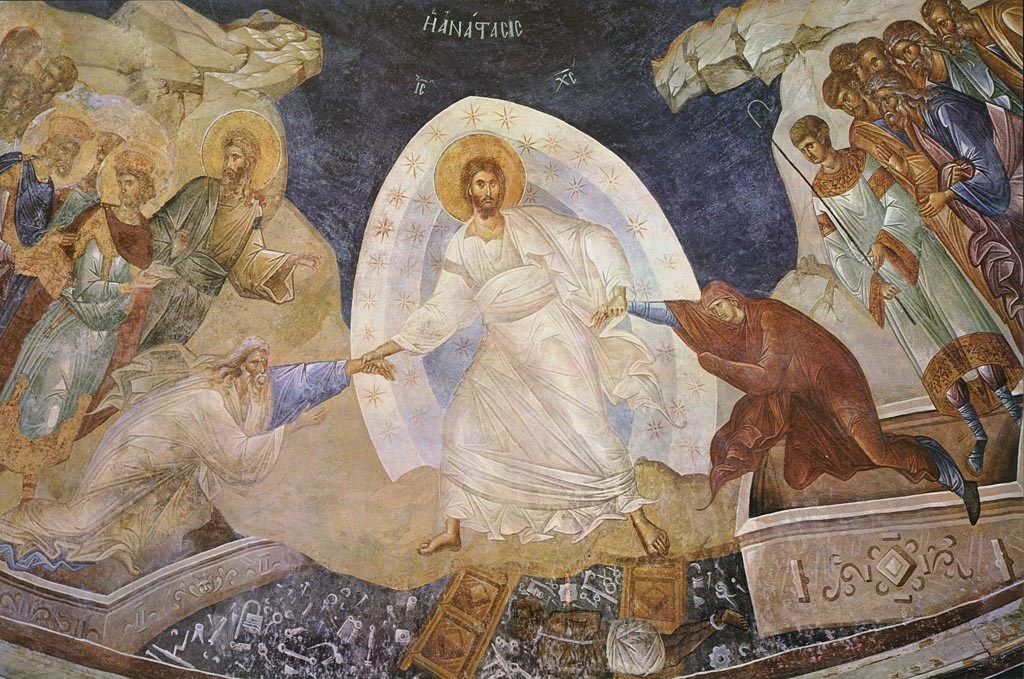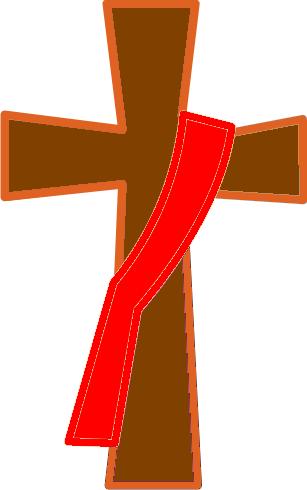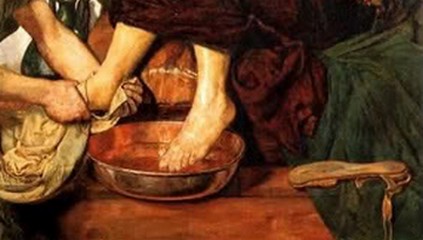====================
A sermon offered on Resurrection Sunday, April 5, 2015, to the people of St. Paul’s Episcopal Church, Medina, Ohio, where Fr. Funston is rector.
(The lessons for the day are Isaiah 25:6-9; Psalm 118:1-2, 14-24; 1 Corinthians 15:1-11 and Mark 16:1-8. These lessons can be read at The Lectionary Page.)
====================

I love poetry. There is something about the way poets describe the world that simply cannot be found in other forms of literature. Poets encourage us not to understand the world, but to experience it; not to be concerned with facts, but to comprehend Truth.
Recently, I’ve been introduced to the world of a Guatemalan woman named Julia Esquivel. Esquivel lived through the Guatemalan civil war which lasted from the 1960s into the 1990s and during which hundreds of thousands of people died in terror sanctioned by the Guatemalan government. Many of these simply “disappeared;” they were the “Desaparecidos,” taken away from their families and never seen again. Many families in Guatemala will never know what happened to their loved one; few of those responsible for the tragedies have stood trial and most never will. Darkness and evil often seem to entomb goodness and light. Into this hopelessness Esquivel’s poetry speaks a word of hope:
There is something here within us
which doesn’t let us sleep, which doesn’t let us rest,
which doesn’t stop pounding deep inside,
it is the silent, warm weeping
of Indian women without their husbands,
it is the sad gaze of the children
fixed there beyond memory,
in the very pupil of our eyes
which during sleep, though closed, keep watch
with each contraction of the heart
in every awakening . . . .
What keeps us from sleeping
is that they have threatened us with resurrection!
Because at each nightfall,
though exhausted from the endless inventory
of killings since 1954,
yet we continue to love life,
and do not accept their death!
. . . . because in this marathon of Hope,
there are always others to relieve us
in bearing the courage necessary
to arrive at the goal which lies beyond death. . . .
Accompany us then on this vigil
and you will know what it is to dream!
You will then know how marvelous it is
to live threatened with resurrection!
To dream awake,
to keep watch asleep
to live while dying
and to already know oneself resurrected!
(From Threatened With Resurrection: Prayers and Poems from an Exiled Guatemalan, September 1982)
Isn’t that wonderful? To “know how marvelous it is to live threatened by resurrection!”
We, unfortunately, live in a world in which other things are threatened — in which the sorts of things that happened in Guatemala (and in many Latin American countries) in the late 20th Century continue to happen in many places. Human cruelty to other humans often astounds us; human indifference to the suffering of other humans amazes us. We live in a world where laws are passed to make it easy for privileged majorities to discriminate against minorities, to abuse those who are unusual, to despoil the lives those who are different, to bury the poor in their poverty, to entomb the stranger in hopelessness, to start wars in distant countries, to trouble us so that “there is something here within us which doesn’t let us sleep, which doesn’t let us rest, which doesn’t stop pounding deep inside.”
Today, we celebrate the Resurrection of Jesus Christ, the One who “exhausted from the endless inventory of killings . . . continue[d] to love life, and [did] not accept . . . death,” the One in whose death and resurrection we acknowledge that, yes indeed, we are “threatened with” resurrection, the One in whom we “already know [ourselves] resurrected.”
I mentioned in our Parish Newsletter for April that one of my favorite contemporary American poets is Kentucky farmer Wendell Berry, and one my favorites among his poems is Manifesto: The Mad Farmer Liberation Front:
Love the quick profit, the annual raise,
vacation with pay. Want more
of everything ready-made. Be afraid
to know your neighbors and to die.
And you will have a window in your head.
Not even your future will be a mystery
any more. Your mind will be punched in a card
and shut away in a little drawer.
When they want you to buy something
they will call you. When they want you
to die for profit they will let you know.
So, friends, every day do something
that won’t compute. Love the Lord.
Love the world. Work for nothing.
Take all that you have and be poor.
Love someone who does not deserve it.
Denounce the government and embrace
the flag. Hope to live in that free
republic for which it stands.
Give your approval to all you cannot
understand. Praise ignorance, for what man
has not encountered he has not destroyed.
Ask the questions that have no answers.
Invest in the millennium. Plant sequoias.
Say that your main crop is the forest
that you did not plant,
that you will not live to harvest.
Say that the leaves are harvested
when they have rotted into the mold.
Call that profit. Prophesy such returns.
Put your faith in the two inches of humus
that will build under the trees
every thousand years.
Listen to carrion – put your ear
close, and hear the faint chattering
of the songs that are to come.
Expect the end of the world. Laugh.
Laughter is immeasurable. Be joyful
though you have considered all the facts.
So long as women do not go cheap
for power, please women more than men.
Ask yourself: Will this satisfy
a woman satisfied to bear a child?
Will this disturb the sleep
of a woman near to giving birth?
Go with your love to the fields.
Lie down in the shade. Rest your head
in her lap. Swear allegiance
to what is nighest your thoughts.
As soon as the generals and the politicos
can predict the motions of your mind,
lose it. Leave it as a sign
to mark the false trail, the way
you didn’t go. Be like the fox
who makes more tracks than necessary,
some in the wrong direction.
Practice resurrection.
(From The Mad Farmer Poems, January 2014)
Esquivel reminds us, in the face of a world of cruelty and death, that we are “threatened with resurrection” and that we should “already know [ourselves] resurrected;” Berry encourages us embrace that “threat” as a promise, to “expect the end of the world [and] laugh,” not merely to know ourselves resurrected, but to act upon that knowledge and “practice resurrection.”
That’s not easy to do in this world, no matter how simple Wendell Berry makes it sound. Sometimes the biggest barrier we face . . . is ourselves. The late Israeli poet Yehuda Amichai writes about this in his short verse The Place Where We Are Right:
From the place where we are right
Flowers will never grow
In the spring.
The place where we are right
Is hard and trampled
Like a yard.
But doubts and loves
Dig up the world
Like a mole, a plow.
And a whisper will be heard in the place
Where the ruined
House once stood.
(From The Selected Poetry Of Yehuda Amichai, Newly Revised and Expanded, October, 1996)
Every single human being on earth is convinced that he or she is right; that’s the nature of human beings and always has been. Judas was sure he was right; the chief priests and the scribes were sure that they were right; Pilate, the Imperial governor, was sure that he was right; the Roman soldiers were sure that they were right. We are always sure that we are right and, thus, we become the ones who pass the laws that make it easy to discriminate, to abuse, to despoil, to crucify, and to entomb beneath that hard and trampled place where we are right, where “there is something here within us which doesn’t let us sleep, which doesn’t let us rest, which doesn’t stop pounding deep inside.”
Yesterday, in our meditations for Holy Saturday, I shared with those assembled here that my favorite artistic depiction of Christ’s Resurrection is an Orthodox icon in which Jesus stands within the arch of his tomb ready to come out. Beneath his feet are the gates of Hell, broken and fallen into the form of a cross, and o either side of him are two other tombs, broken open. From them Christ is pulling two figures, a man and a woman representing Adam and Eve. They seem almost reluctant to leave their graves, but Jesus grasps them by their wrists and seems to strain to lift them. Behind them are ranged the prophets and patriarchs of Israel, the righteous dead awaiting resurrection. This liberation of those who were already dead is known as the “Harrowing of Hell,” which is the title of poet Denise Levertov’s contemplation of this icon:
Down through the tomb’s inward arch
He has shouldered out into Limbo
to gather them, dazed, from dreamless slumber:
the merciful dead, the prophets,
the innocents just His own age and those
unnumbered others waiting here
unaware, in an endless void He is ending
now, stooping to tug at their hands,
to pull them from their sarcophagi,
dazzled, almost unwilling. Didmas,
neighbor in death, Golgotha dust
still streaked on the dried sweat of his body
no one had washed and anointed, is here,
for sequence is not known in Limbo;
the promise, given from cross to cross
at noon, arches beyond sunset and dawn.
All these He will swiftly lead
to the Paradise road: they are safe.
That done, there must take place that struggle
no human presumes to picture:
living, dying, descending to rescue the just
from shadow, were lesser travails
than this: to break
through earth and stone of the faithless world
back to the cold sepulchre, tearstained
stifling shroud; to break from them
back into breath and heartbeat, and walk
the world again, closed into days and weeks again,
wounds of His anguish open, and Spirit
streaming through every cell of flesh
so that if mortal sight could bear
to perceive it, it would be seen
His mortal flesh was lit from within, now,
and aching for home. He must return,
first, in Divine patience, and know
hunger again, and give
to humble friends the joy
of giving Him food – fish and a honeycomb.
(From A Door in the Hive, October 1989)
Levertov, I think, is probably right when she suggests that the work of freeing those trapped in Hell was, for Christ, easier than “break[ing] through [the] earth and stone of the faithless world;” breaking through where privileged majorities to discriminate against minorities, abuse those who are unusual, despoil the lives those who are different, bury the poor in their poverty, entomb the stranger in hopelessness, and start wars in distant countries; breaking through the hard and trampled place where we insist that we are right . . . but break through he does for he is the love that digs up the world so that whispers are again heard where the ruined houses of our lives once stood.
Do you doubt that? Do you have difficulty feeling that promise of resurrection? Do you not feel threatened with resurrection in your own life? Do you not know yourself already resurrected?
At the vigil service each year, in place of a sermon of my own, I follow the ancient tradition of the Orthodox church and read for those present an oration or homily from one of the early doctors of the church; today I read selections from St. Gregory Nazianzan’s Second Easter Oration. In part of that great speech, St. Gregory offers advice on how one can enter personally into the Resurrection; if one cannot comprehend the whole of the story, focus on that part which most resonates with you. This is what he wrote:
If you are a Simon of Cyrene, take up the Cross and follow.
If you are crucified with Him as a robber, acknowledge God as a penitent robber.
If even He was numbered among the transgressors for you and your sin, do you become law-abiding for His sake. Worship Him Who was hanged for you, even if you yourself are hanging; make some gain even from your wickedness; purchase salvation by your death; enter with Jesus into Paradise, so that you may learn from what you have fallen.
Contemplate the glories that are there; let the murderer die outside with his blasphemies; and if you be a Joseph of Arimathæa, beg the Body from him that crucified Him, make your own that which cleanses the world.
If you be a Nicodemus, the worshiper of God by night, bury Him with spices.
If you be a Mary, or another Mary, or a Salome, or a Joanna, weep in the early morning. Be first to see the stone taken away, and perhaps you will see the Angels and Jesus Himself.
Say something; hear His Voice. If He say to you, Touch Me not, stand afar off; reverence the Word, but grieve not; for He knows those to whom He appears first.
Keep the feast of the Resurrection; come to the aid of Eve who was first to fall, of Her who first embraced the Christ, and made Him known to the disciples.
Be a Peter or a John; hasten to the Sepulchre, running together, running against one another, vying in the noble race. And even if you be beaten in speed, win the victory of zeal; not Looking into the tomb, but Going in.
And if, like a Thomas, you were left out when the disciples were assembled to whom Christ shows Himself, when you do see Him be not faithless; and if you do not believe, then believe those who tell you; and if you cannot believe them either, then have confidence in the print of the nails.
If He descended into Hell, descend with Him. Learn to know the mysteries of Christ there also, what is the providential purpose of the twofold descent, to save all [humankind] absolutely by His manifestation.
(From Oration 45, Nicene and Post-Nicene Fathers, Second Series, Volume 7, February 1996)
Become a part of the story in whatever way you can. If you cannot now comprehend the whole, grab hold of that fraction that resonates for you, but do not strive to understand, do not strive to be right, do not trample hard a place where flowers will never grow; instead, enter into the narrative, simply experience the truth, put your faith in two inches of spiritual humus where you may plant things you may not live to harvest. Remember that Christ is the love Who digs up the world, Who breaks through faithless earth and stone, expect the end of the world and laugh:
Accompany us then on this vigil
and you will know what it is to dream!
You will then know how marvelous it is
to live threatened with resurrection!
To dream awake,
to keep watch asleep
to live while dying
and to already know [your]self resurrected!
Christ is Risen! We are risen! Alleluia!
(Note: The illustration above is widely agreed to be the most striking exemplar of the traditional Byzantine Anastasis icon. It is the fresco in the apse of the arekklesion or funerary chapel, of the Monastery of Chora at Istanbul.)
====================
A request to my readers: I’m trying to build the readership of this blog and I’d very much appreciate your help in doing so. If you find something here that is of value, please share it with others. If you are on Facebook, “like” the posts on your page so others can see them. If you are following me on Twitter, please “retweet” the notices of these meditations. If you have a blog of your own, please include mine in your links (a favor I will gladly reciprocate). Many thanks!
====================
Father Funston is the rector of St. Paul’s Episcopal Church, Medina, Ohio.


 Every year on Maundy Thursday in the Episcopal Church we do this thing: we gather for Eucharist and we hear these lessons – the story of the Passover from the Book of Exodus, St. Paul’s retelling of the institution narrative of the Eucharist, and St. John’s story of the Last Supper in which he focuses not on the meal but on Jesus’ act of humility and service during the meal (probably quite early in the evening) of washing the feet of the others present.
Every year on Maundy Thursday in the Episcopal Church we do this thing: we gather for Eucharist and we hear these lessons – the story of the Passover from the Book of Exodus, St. Paul’s retelling of the institution narrative of the Eucharist, and St. John’s story of the Last Supper in which he focuses not on the meal but on Jesus’ act of humility and service during the meal (probably quite early in the evening) of washing the feet of the others present. The four evangelists are traditionally represented by iconic depictions of the emphasis of their gospels. John, whose gospel is the longest and most different of the four tellings of Jesus’ story, is represented by an eagle because he emphasizes the divinity of Christ. Matthew, on the other hand, begins his gospel with Jesus’ genealogy and emphasizes the humanity of the Savior, so he is represented by a man. Luke emphasizes the sacrificial nature of Jesus’ ministry and mission; thus, he is represented by an ox or bull (often winged), the sort of animal offered in the Temple.
The four evangelists are traditionally represented by iconic depictions of the emphasis of their gospels. John, whose gospel is the longest and most different of the four tellings of Jesus’ story, is represented by an eagle because he emphasizes the divinity of Christ. Matthew, on the other hand, begins his gospel with Jesus’ genealogy and emphasizes the humanity of the Savior, so he is represented by a man. Luke emphasizes the sacrificial nature of Jesus’ ministry and mission; thus, he is represented by an ox or bull (often winged), the sort of animal offered in the Temple. Today is the Third Sunday in Lent but, being March 8, it is also the day set aside on the calendar (both that of the Church of England and that of the Episcopal Church) for us to remember a hero of the Anglican tradition, a World War I chaplain named Geoffrey Anketell Studdert-Kennedy. In 1914 he became the vicar of St. Paul’s, Worcester, UK, but a short while later, on the outbreak of war, Kennedy volunteered as a chaplain to the armed forces. He gained the nickname “Woodbine Willie,” for his practice of giving out Woodbine brand cigarettes to soldiers. In 1917, he won the United Kingdom’s Military Cross for bravery at Messines Ridge.
Today is the Third Sunday in Lent but, being March 8, it is also the day set aside on the calendar (both that of the Church of England and that of the Episcopal Church) for us to remember a hero of the Anglican tradition, a World War I chaplain named Geoffrey Anketell Studdert-Kennedy. In 1914 he became the vicar of St. Paul’s, Worcester, UK, but a short while later, on the outbreak of war, Kennedy volunteered as a chaplain to the armed forces. He gained the nickname “Woodbine Willie,” for his practice of giving out Woodbine brand cigarettes to soldiers. In 1917, he won the United Kingdom’s Military Cross for bravery at Messines Ridge.

